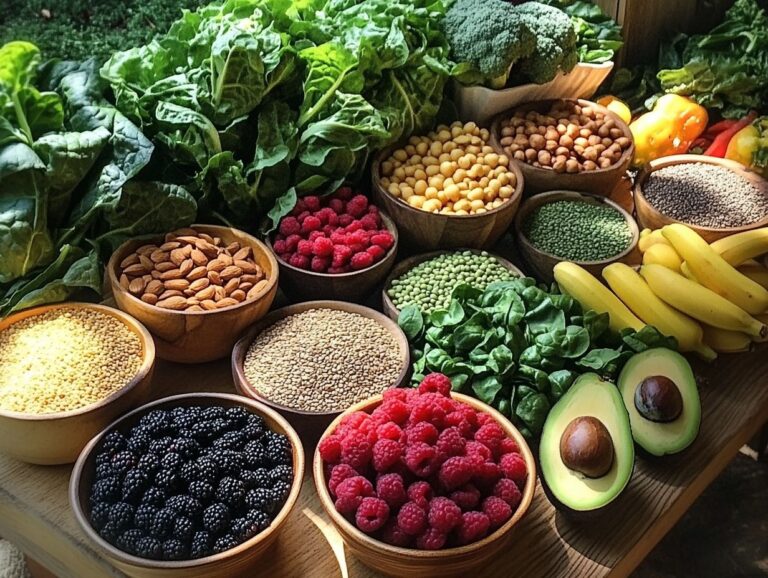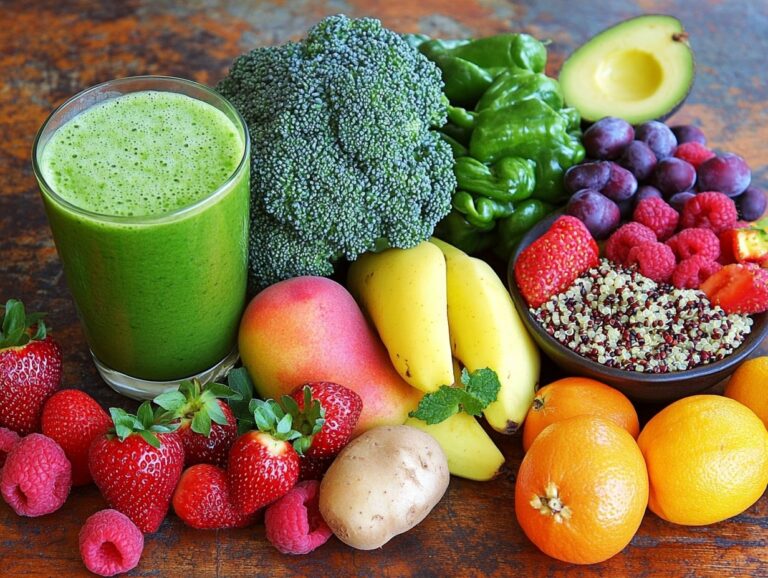In recent years, both the Alkaline and Vegan diets have gained popularity as individuals seek dietary options that promote better health. The Alkaline diet focuses on foods that help maintain a balanced pH level in the body, while the Vegan diet emphasizes a plant-based approach by eliminating all forms of animal products. This article will outline the key differences between the Alkaline and Vegan diets, explore their respective benefits and risks, and discuss how to combine elements of both for a healthier lifestyle.
What Is the Alkaline Diet?
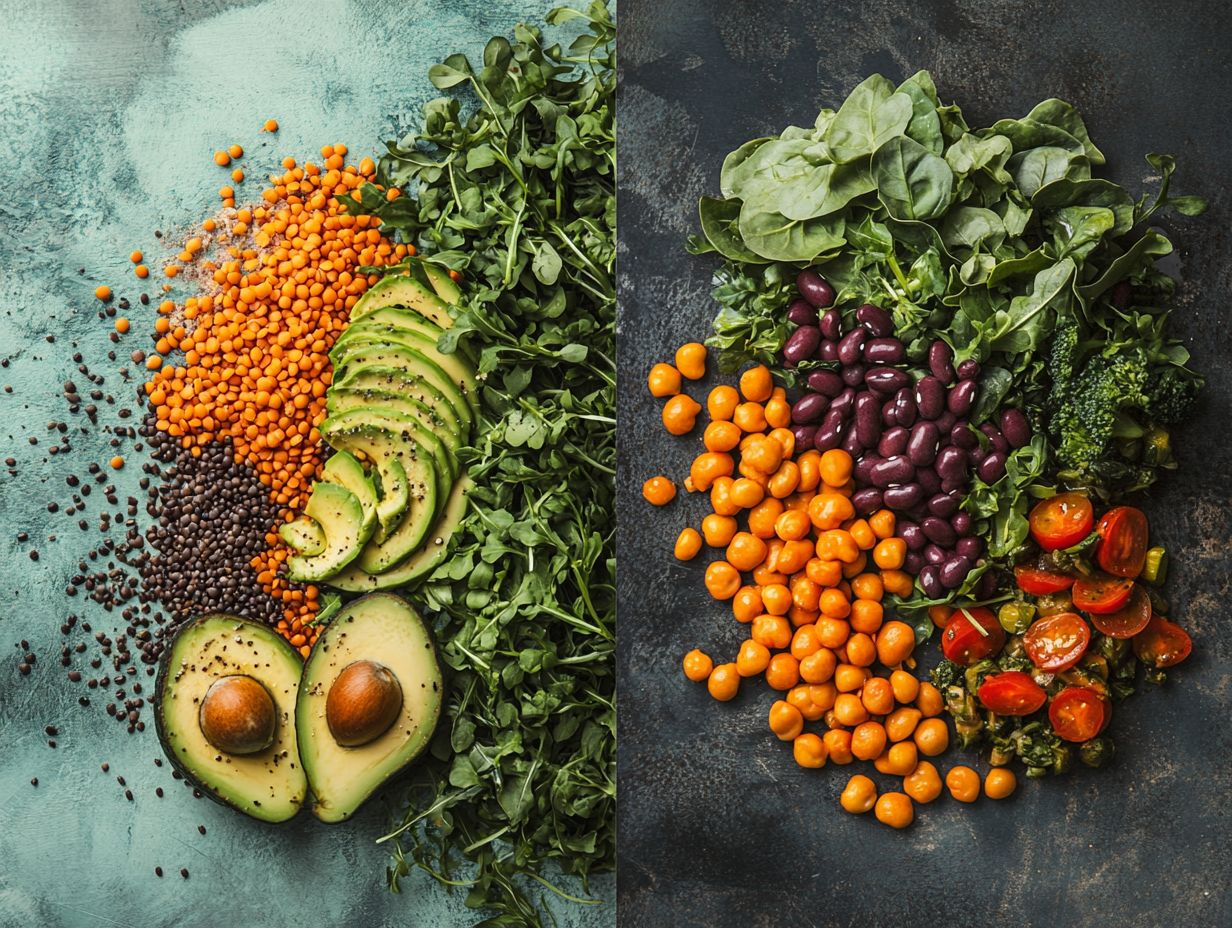
The alkaline diet is a nutritional approach that focuses on consuming alkaline foods while minimizing acidic foods to promote a balanced blood pH level, crucial for optimal health.
Advocates of this diet, including notable figures like Robert O. Young, argue that maintaining an alkaline environment in the body can provide numerous health benefits, such as cancer prevention, detoxification, and a reduced risk of chronic diseases like diabetes and hypertension.
This diet primarily consists of whole foods, including fruits, vegetables, legumes, and nuts, while discouraging processed foods and animal products, thereby promoting a plant-based lifestyle.
What Is a Vegan Diet?
A vegan diet is a plant-based dietary pattern that excludes all animal products, including meat, dairy, and eggs, while emphasizing the consumption of whole foods like fruits, vegetables, grains, legumes, nuts, and seeds.
This dietary approach, also endorsed by celebrities like Gwyneth Paltrow, Jennifer Aniston, and Kate Hudson, has gained popularity for its potential health benefits, which may include weight management, a reduced risk of chronic diseases such as diabetes and hypertension, and overall improved health.
However, following a vegan diet can lead to nutrient deficiencies if careful food choices are not made. It is essential to ensure adequate intake of vital nutrients such as vitamin B12, omega-3 fatty acids, and iron.
What Are the Differences Between the Alkaline Diet and Vegan Diet?
The alkaline diet and the vegan diet both promote healthy eating patterns and significant health benefits, but they differ significantly in their core philosophies and dietary restrictions.
The alkaline diet focuses primarily on maintaining optimal pH levels in the body by consuming alkaline foods and limiting acidic foods. In contrast, the vegan diet emphasizes the elimination of all animal products to encourage a plant-based lifestyle.
While both diets prioritize whole foods and aim to provide health benefits, such as cancer prevention and the reduction of chronic diseases, the vegan diet may sometimes lead to specific nutrient deficiencies due to its strict exclusion of certain food groups.
1. Focus on pH Levels
The significance of pH levels is a fundamental principle of the alkaline diet, which aims to establish a healthy alkaline environment in the body by promoting the consumption of low-acid foods that help maintain balanced blood pH levels and support overall detoxification.
This dietary approach encourages the intake of leafy vegetables, fruits, nuts, and seeds, all of which are believed to foster an alkaline environment that can enhance overall health and reduce the risks associated with chronic diseases.
In contrast, the vegan diet does not explicitly focus on pH modulation, so individuals may consume varying amounts of highly acidic foods, such as certain grains or legumes, without considering their impact on acidity.
Therefore, the alkaline diet not only advocates for healthy food choices but also promotes awareness of how different foods influence the body’s acidity and alkalinity.
2. Animal Products Allowed
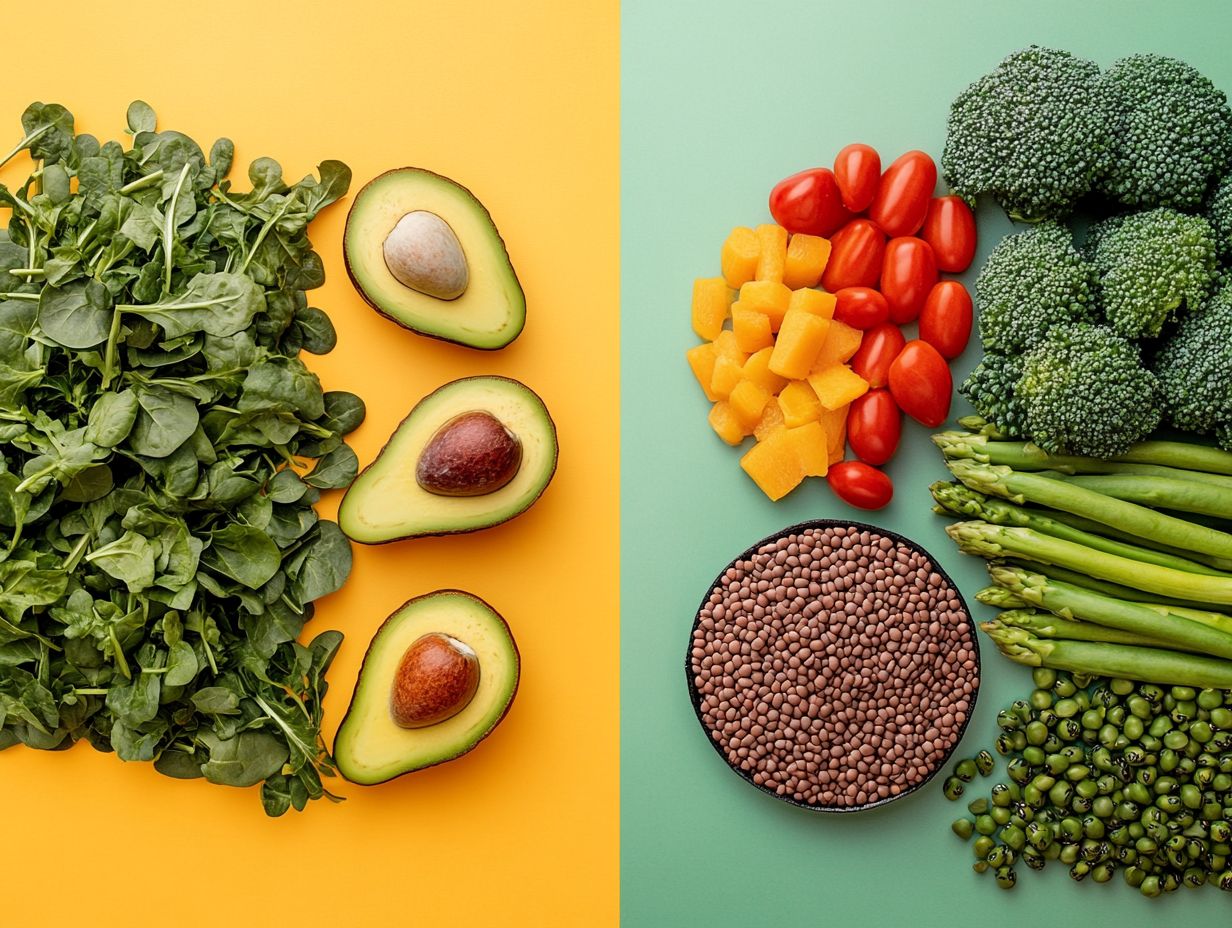
Unlike the vegan diet, the alkaline diet permits the occasional consumption of certain animal products, such as sustainably sourced fish or eggs, as it focuses on the overall pH impact of foods rather than their sources. This distinction significantly affects the food choices available to individuals following each diet.
The vegan diet strictly prohibits the consumption of meat, dairy, and any other ingredients derived from animals or insects. In contrast, the alkaline diet encourages the intake of fruits, vegetables, nuts, and seeds, while allowing for the inclusion of fish or eggs in moderation, provided they are sustainably sourced or organically raised.
This flexibility can lead to differences in nutritional value; for instance, the alkaline diet may offer certain nutrients typically found in animal products, such as omega-3 fatty acids and vitamin B12, which are often deficient in a vegan diet unless carefully planned.
3. Emphasis on Whole Foods
Both the alkaline diet and the vegan diet emphasize the importance of whole foods, advocating for the consumption of minimally processed options to maximize health benefits and nutritional value while minimizing the intake of processed foods, including processed meats.
By focusing on whole foods, both approaches not only support overall wellness but also enhance the intake of essential vitamins, minerals, and antioxidants, promoting a vibrant and energized lifestyle.
The alkaline diet highlights foods believed to promote a more balanced pH in the body, such as:
- leafy greens
- avocados
- nuts
In contrast, the vegan diet champions an entirely plant-based approach, which includes a variety of:
- legumes
- fruits
- whole grains
These distinctions in accepted food selections reflect their individual philosophies: the alkaline diet prioritizes alkalinity for its purported health benefits, while the vegan diet is centered on ethical considerations and long-term environmental sustainability.
4. Potential Nutrient Deficiencies
One significant aspect to consider when comparing the alkaline diet and the vegan diet is the potential for nutrient deficiencies, particularly in the vegan diet. The elimination of animal products can result in shortages of key nutrients such as vitamin B12, omega-3 fatty acids, and vitamins D, which play important roles in maintaining healthy blood, bone structure, and overall wellness.
This deficiency can pose serious health risks, including fatigue, neurological issues, and impaired heart function, as these nutrients play vital roles in energy metabolism and cognitive health. Those following a vegan lifestyle often experience lower levels of iron and calcium, which are crucial for maintaining healthy blood and bone structure.
Similarly, the alkaline diet, while typically rich in fruits and vegetables that provide essential vitamins, can also lead to imbalances if not properly managed. Individuals on this diet may find themselves lacking in protein and certain vitamins, such as vitamin D, particularly if they do not incorporate fortified foods or supplements.
Therefore, understanding these dietary nuances is essential for anyone considering these dietary patterns, as misinformed health claims could lead to adverse health effects.
What Are the Benefits of the Alkaline Diet?
The health benefits of the alkaline diet, including potential cancer prevention, detoxification, and reducing the risk of chronic diseases like hypertension and osteoporosis, stem from its emphasis on consuming alkaline foods and reducing the intake of acidic foods that may contribute to chronic ailments.
What Are the Benefits of a Vegan Diet?
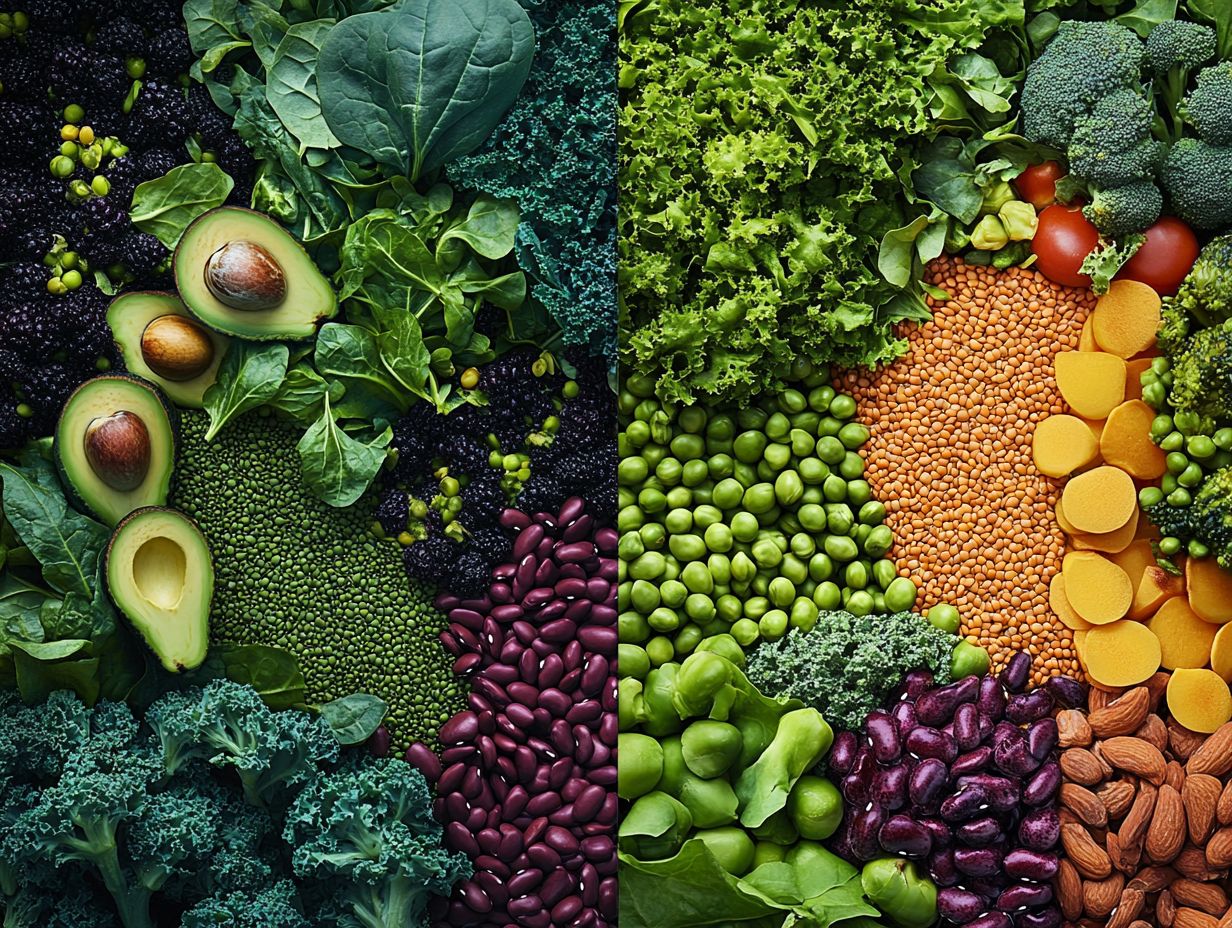
The vegan diet is linked to numerous health benefits, including weight control, improved cardiovascular health, and a reduced risk of chronic diseases such as diabetes, obesity, and certain types of cancer, all of which can be attributed to its plant-based dietary pattern.
What Are the Potential Risks of the Alkaline Diet?
The alkaline diet poses potential risks, including the likelihood of nutrient deficiencies due to the exclusion of certain food groups and the reliance on health claims that may not be fully substantiated.
What Are the Potential Risks of a Vegan Diet?
The vegan diet carries potential risks, particularly nutrient deficiencies, if individuals do not make careful food choices to ensure they obtain the nutrients typically found in animal products.
Which Diet Is Better for Your Health?
The choice between an alkaline diet and a vegan diet for better health largely depends on individual health goals, dietary habits, and lifestyle practices that align with personal beliefs and nutritional needs, as highlighted by experts from reputable institutions like the Cleveland Clinic.
1. Personal Health Goals
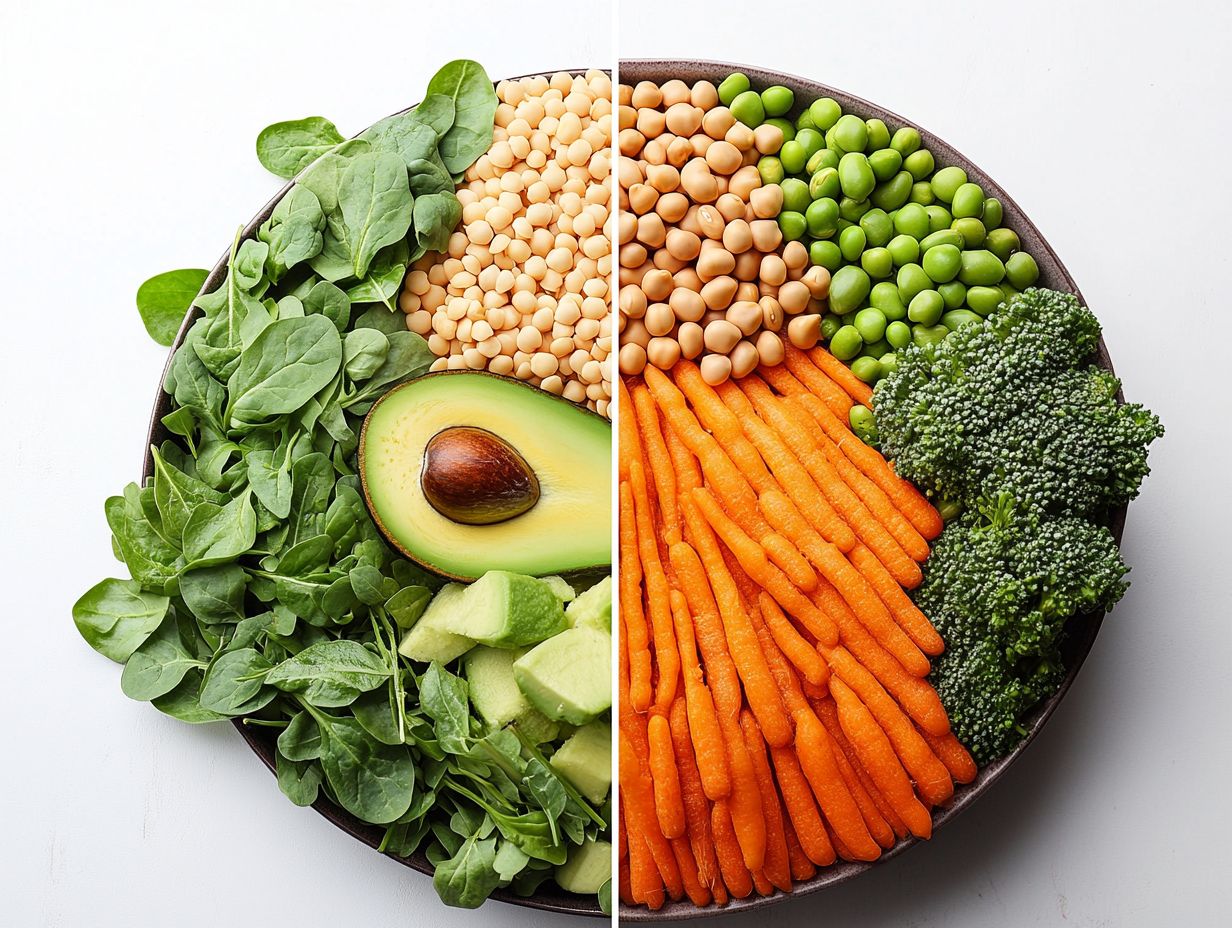
Personal health goals play a significant role in the decision between adopting an alkaline or vegan diet, as individuals may choose one over the other based on their preferences for weight loss, disease prevention, such as cancer prevention and osteoporosis, or overall wellness.
For instance, someone aiming for weight loss may opt for a vegan diet rich in plant-based foods, including fruits, vegetables, and whole grains, which are low in calories yet high in nutrients.
On the other hand, a person focused on achieving pH balance might be more inclined to adopt an alkaline diet that emphasizes leafy greens, nuts, and certain fruits that promote a more alkaline environment in the body.
Personal motivations can significantly influence dietary choices, leading to better health outcomes and helping individuals align with their beliefs and lifestyles.
By understanding the connections between these factors, individuals can make informed choices that support their health goals.
2. Nutritional Needs
Understanding one’s nutritional needs is essential when comparing the alkaline diet and the vegan diet, as each diet meets different nutritional requirements and may have various deficiencies. Individuals should be mindful of their dietary needs to avoid inadvertently depriving themselves of essential vitamins and minerals.
The alkaline diet emphasizes the consumption of foods such as fruits and vegetables, which typically results in higher intake of potassium and magnesium. However, it may lead to lower intakes of protein and B vitamins if not properly managed.
On the other hand, vegan diets that include a variety of legumes, grains, and nuts provide ample fiber and antioxidants but can result in potential deficiencies in vitamin B12 and omega-3 fatty acids. Those who choose either dietary approach should consider incorporating a variety of food sources or supplements to meet their specific nutritional needs.
3. Budget and Accessibility
Budget and accessibility are significant factors that influence the practicality of an alkaline diet compared to veganism, as both dietary approaches come with varying costs and access to specific food choices and lifestyle practices.
For instance, individuals following an alkaline diet may need to prioritize fresh fruits and vegetables, which can be more expensive than processed foods. This often necessitates careful planning and may require shopping at local farmers’ markets to secure the best prices for organic items.
Conversely, those following a vegan diet frequently encounter challenges in finding affordable sources of protein, such as beans and lentils, that align with their dietary principles. These challenges highlight the importance of understanding one’s economic situation and local food environment when considering budget and accessibility, as both diets may require a reassessment of food budgets and available resources.
4. Sustainability
Sustainability is a crucial factor when comparing the alkaline diet and the vegan diet, as both dietary patterns have different environmental impacts. The vegan diet is often considered more sustainable due to its emphasis on plant-based foods. However, the alkaline diet, which focuses on balancing the body’s pH levels through nutrient-dense alkaline foods, also presents sustainability aspects worth exploring.
When examining how food choices affect environmental health, it becomes clear that the sourcing, production, and transportation of food significantly contribute to the overall carbon footprint. For example, the vegan diet primarily consists of fruits, vegetables, legumes, and whole grains, which generally require fewer resources and produce less waste.
In contrast, the alkaline diet may include a wider variety of produce, and its sustainability can vary.
Understanding how these dietary choices align with sustainable farming practices, alongside their potential health benefits, can help individuals nourish their bodies while being mindful of the planet.
How Can You Incorporate Elements of Both Diets for Optimal Health?
The alkaline diet and vegan diet can be effectively combined for optimal health, as the overlap between the two allows individuals to enjoy the advantages of both plant-based eating and pH balance.
This combination creates a comprehensive approach to healthy eating.


